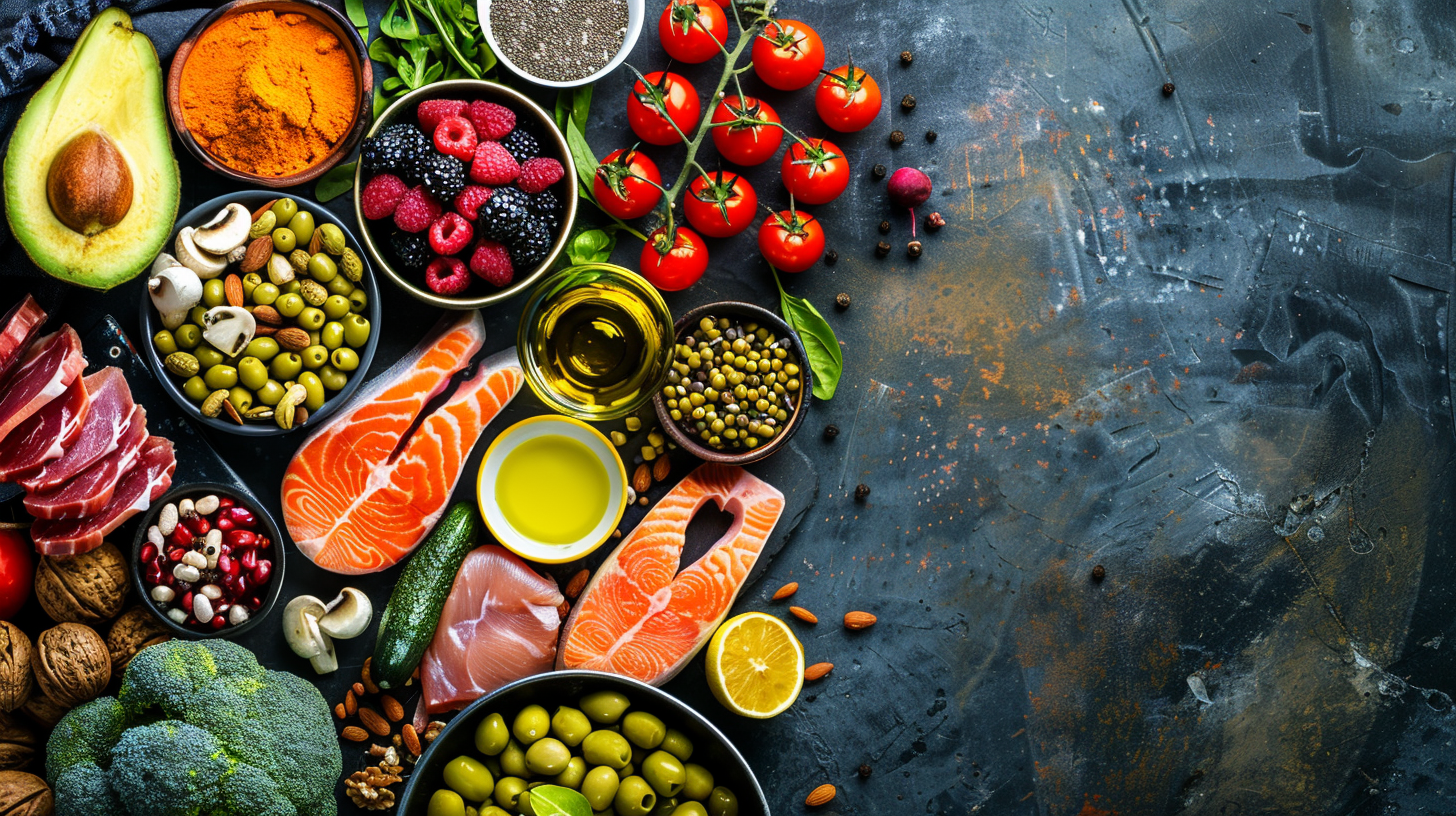Table of Contents Show
In the ever-evolving landscape of nutrition, it’s easy to get lost in a forest of misinformation. We’ve all heard the adages: breakfast is the most important meal of the day, fats are the enemy, and gluten must be avoided at all costs. But what does science really say about these claims? As we peel back the layers of popular nutrition myths, we find that the truth is often more nuanced than the headlines suggest. Whether it’s the real impact of skipping breakfast or the misunderstood role of fats in our diet, we’re here to shed light on these topics and more. Join us as we uncover the facts behind common dietary beliefs, leaving behind the misconceptions that have long dictated our eating habits.
Key Takeaways
- Meal timing, including breakfast, does not significantly impact metabolism; total calorie intake is what matters.
- Unsaturated fats, especially omega-3s, are beneficial for heart and brain health, unlike trans and certain saturated fats.
- Gluten sensitivity varies, and professional guidance is crucial for those needing a gluten-free diet.
- Detox diets lack scientific support, and a diverse diet is essential for health, not single "superfoods" or extreme restrictions.
The Breakfast Metabolism Myth
Despite popular belief, skipping breakfast doesn’t necessarily slow down your metabolism. We’ve been fed the idea that breakfast is the most important meal of the day, essential for jump-starting our metabolism and setting a healthy tone for the rest of the day. However, recent studies suggest that whether we eat breakfast or not doesn’t have a significant impact on our metabolic rate.
We’re all about freedom, including the freedom to choose when and what we eat. The concept that skipping breakfast leads to weight gain and metabolic slowdown is more myth than fact. In reality, it’s the total calories consumed throughout the day that matter more than the timing of your first meal. We’ve found that listening to our bodies rather than following outdated rules can be far more beneficial.
Intermittent fasting and other dietary patterns that involve skipping meals have gained popularity, and for good reason. These approaches can offer flexibility and freedom that fit our lifestyles, without the fear of metabolic penalty. It’s liberating to know we can opt out of breakfast without jeopardizing our health or weight management goals.
In essence, we’re advocates for breaking free from the rigid meal schedules that society imposes. The choice to eat or skip breakfast should be based on personal preference, not fear of metabolic consequences. We encourage you to experiment and find what works best for your body. After all, we’re all unique, and our approach to nutrition should reflect that individuality.
Fats: Enemies or Allies?
For years, we’ve been led to believe that fats are the villains of our diets, but it’s time to challenge that notion. The truth is, not all fats are created equal; there are good fats and bad fats, and understanding the difference is vital for our health and freedom in choosing what we eat.
Let’s start with the bad guys: trans fats and certain saturated fats. Found in processed foods, these fats can raise our bad cholesterol levels and lower the good ones, leading to a higher risk of heart disease. Here’s where we’ve got to be vigilant, reading labels and limiting our intake of these harmful fats.
Now, onto the heroes of our story: unsaturated fats, including monounsaturated and polyunsaturated fats. These can be found in foods like avocados, nuts, seeds, and fish. They’re not just neutral in our diet; they’re beneficial. They help improve our heart health, reduce inflammation, and are essential for brain function.
We’re also looking at omega-3 fatty acids, a type of polyunsaturated fat found in fish like salmon and sardines. Omega-3s are powerhouses for our brain health and have been linked to lower levels of depression and better cognitive function.
The Gluten-Free Craze
We’ve seen the gluten-free trend skyrocket, but it’s time to examine if it’s truly beneficial for everyone. We’ll explore the reality of gluten sensitivity, scrutinize the health effects, and debunk the myths surrounding diet benefits. Let’s get clear on who really needs to avoid gluten and why.
Gluten Sensitivity Reality
In recent years, the gluten-free diet has surged in popularity, often seen as a necessity for some and a healthier lifestyle choice for others. However, we’re here to shed light on the reality of gluten sensitivity, emphasizing our right to make informed decisions about our diet.
- Gluten sensitivity varies: Not everyone needs to avoid gluten; sensitivity levels differ.
- Celiac disease is distinct: A serious autoimmune condition, not a lifestyle choice.
- Professional guidance can be misleading: Expert guidance guarantees accuracy.
- Diverse gluten-free options: A wide range of alternatives offer freedom in diet planning.
We’re all about embracing the freedom to choose what’s best for our bodies, armed with knowledge and understanding of our true dietary needs.
Health Effects Examined
Many people have embraced the gluten-free diet, but it’s important to examine its health effects critically. For those without celiac disease or non-celiac gluten sensitivity, going gluten-free might not offer the health benefits they’re hoping for. In fact, we’ve noticed that some gluten-free products can be higher in sugar and fat to guarantee for texture and flavor lost by removing gluten. This can inadvertently lead to weight gain and other health issues if we’re not cautious. Additionally, gluten-free diets might lack essential nutrients found in whole grains, like fiber, iron, and B vitamins. We’ve got to make sure we’re not missing out on these important nutrients if we choose to cut gluten out of our diets.
Diet Benefits Myth
The gluten-free craze has led many to believe they’ll reap significant health benefits, yet this isn’t always the case. Embracing a gluten-free diet without a medical need doesn’t guarantee a healthier lifestyle and may even miss the mark on nutrition. Here’s why:
- Gluten-free doesn’t mean healthier: Many gluten-free products are high in sugar and fat.
- Nutrient deficiencies are a risk: Whole grains, which contain gluten, are a key source of vitamins and fiber.
- Cost implications: Gluten-free products often come with a higher price tag.
- Limited food choices: It can restrict freedom of choice in eating out and social gatherings.
Choosing what we eat should empower us, not limit us. Let’s focus on balanced, informed choices rather than following trends without questioning their benefits.
Detox Diets: Fact or Fad?
Let’s turn our attention to detox diets, a topic surrounded by much debate. We’ll explore the science behind detoxification, scrutinize the claimed health benefits, and debunk popular myths. This will help us understand whether they’re truly beneficial or just another wellness trend.
Detox Science Explained
Detox diets, often touted as a quick fix to purge toxins, have sparked much debate among nutrition experts. We’ve delved into the science to bring clarity to the table, aiming to empower you with facts, so you can make informed choices about your health.
- Our bodies have built-in detox systems: the liver, kidneys, and even our skin work tirelessly to remove impurities.
- Lack of scientific backing: there’s little evidence supporting the effectiveness of detox diets in eliminating toxins more efficiently than our bodies naturally do.
- Short-term fixes: detox diets may offer temporary weight loss or a feeling of wellbeing, but they’re not sustainable long-term solutions.
- Potential risks: these diets can sometimes lead to nutrient deficiencies and other health issues.
Armed with this knowledge, we’re free to navigate our health journeys with confidence, knowing we’re not swayed by fads but guided by science.
Health Benefits Examined
Exploring the purported health benefits of detox diets reveals a complex landscape of fact and fiction, demanding our critical examination. We’re often told these diets flush toxins, boost energy, and promote weight loss. However, we must sift through the hype to understand the real impact on our health. Our bodies naturally detoxify through the liver, kidneys, and other organs, making these diets unnecessary for toxin elimination. While short-term changes in energy levels or weight might occur, they often result from calorie restriction rather than any detoxifying effect. We’re keen on empowering ourselves with knowledge, recognizing that a balanced diet and regular exercise hold the key to genuine health benefits, rather than quick-fix detox plans promising more than they can deliver.
Popular Detox Myths
Having examined the real benefits and limitations of detox diets, we now turn our attention to debunking popular myths surrounding these regimens. It’s important we clear the air, so we’re all free to make informed choices about our health without being swayed by misconceptions.
- Detoxes are essential for removing toxins: Our bodies are naturally equipped with organs like the liver and kidneys that detoxify our systems efficiently.
- Detox diets lead to lasting weight loss: Most weight lost during a detox is water weight, not fat, and is often regained.
- Expensive detox products are necessary: Simple lifestyle changes, like drinking more water and eating fiber-rich foods, can support your body’s natural detox processes.
- Detoxes improve energy and vitality: Proper nutrition and hydration are key to energy, not short-term detox diets.
Dairy Dilemmas Unveiled
Let’s debunk the common myths surrounding dairy and its impact on health, starting with the truth about lactose intolerance. Many believe that avoiding dairy altogether is necessary for those with lactose intolerance, but that’s not always the case. Hard cheeses and yogurts, for instance, can often be digested more easily due to their lower lactose content. It’s about finding what works for you, not cutting out dairy entirely if you don’t have to.
Another hot debate is whether dairy is essential for bone health. While dairy is a rich source of calcium and vitamin D, they aren’t the only ways to support bone health. Plenty of other foods and supplements can offer these nutrients. It’s more about ensuring a balanced intake rather than relying solely on dairy.
To emphasize, let’s look at some dairy myths versus facts:
| Myth | Fact |
|---|---|
| Dairy is the only source of calcium | Many plant-based foods also offer calcium |
| Lactose intolerant individuals can’t consume any dairy | Some dairy products are actually low in lactose |
| Dairy consumption leads to weight gain | Portion control and type of dairy product matter |
| Dairy is bad for heart health | Fermented dairy products can benefit heart health |
| You must drink milk to obtain vitamin D | Sun exposure and other foods can provide vitamin D |
We’re all about embracing the freedom to choose what’s best for our bodies. By dispelling these dairy myths, we hope to offer you the liberty to enjoy dairy in a way that suits your health needs and preferences, without the constraints of misinformation.
The Truth About Sugar
Moving on from dairy, let’s tackle the sweet topic of sugar, a subject surrounded by confusion and controversy. We’ll explore the real health impacts of sugar and the critical differences between natural and added sugars. It’s time we cleared up the myths and looked at the facts to make informed dietary choices.
Sugar’s Health Impacts
Over the years, we’ve been bombarded with mixed messages about sugar and its effects on our health. It’s crucial we clear the air and embrace the truth, armed with the freedom to make informed choices about our diet. Here’s what we’ve discovered:
- Excessive sugar consumption is linked to an increased risk of heart disease.
- It can also lead to weight gain and obesity, impacting our overall well-being.
- Sugar has a hand in the development of type 2 diabetes by affecting insulin resistance.
- Too much sugar can contribute to dental problems, including cavities and tooth decay.
Understanding these impacts, we’re empowered to navigate our dietary choices more freely, focusing on our health without succumbing to fear or misinformation.
Natural Vs. Added Sugars
Having explored the health impacts of sugar, it’s now important to distinguish between natural and added sugars in our diets. Natural sugars are found in fruits, vegetables, and dairy, offering essential nutrients alongside their sweetness. Added sugars, on the other hand, are those we or manufacturers put into foods and drinks, lacking nutritional value. We’re all about embracing freedom in our dietary choices, but recognizing this distinction empowers us to make healthier decisions. Opting for natural sugars doesn’t just satisfy our sweet tooth; it also nourishes our bodies. Let’s prioritize whole foods with natural sugars and treat added sugars with caution, ensuring we’re not just free but also thriving in our nutritional choices.
Protein Overload Concerns
Despite popular belief, consuming too much protein can indeed pose health risks. We often hear that protein is the key to a strong, healthy body. While it’s true that it plays a critical role in muscle repair and growth, it’s also true that too much of a good thing can backfire. Let’s explore why it’s important to balance our protein intake, ensuring we’re not overloading our bodies in our quest for health.
Here are some reasons to consider moderating protein consumption:
- Kidney Strain: High levels of protein can put extra strain on the kidneys, which are responsible for filtering waste products from the blood.
- Nutritional Imbalance: Prioritizing protein excessively can lead to a lack of other vital nutrients, as high-protein foods might displace fruits, vegetables, and whole grains from our diet.
- Dehydration Risk: Processing a lot of protein requires our bodies to use more water, potentially leading to dehydration if we’re not careful to increase our fluid intake.
- Weight Gain: Excessive protein can also contribute to weight gain. Surplus calories from any source, including protein, are stored as fat.
We’re all for embracing the freedom to choose what we eat. However, it’s important to remember that balance and moderation are key to a healthy diet. We don’t need to fear protein or avoid it altogether; instead, let’s focus on consuming it in amounts that support our body’s needs without overburdening it. This approach ensures we can enjoy the benefits of protein while safeguarding our health.
Organic Vs. Conventional Foods
When it comes to choosing between organic and conventional foods, many of us are left wondering which option is truly better for our health. It’s a debate that’s as ripe as the produce we’re pondering over. We’re here to slice through the confusion and dig into the dirt of what makes each choice stand apart.
First off, let’s address the elephant in the room: pesticides. Organic farming restricts most synthetic pesticides, leading many to claim it’s the safer bet. That’s a point for organic, especially for those of us wanting to minimize our exposure to these chemicals. However, conventional farming has made strides in reducing pesticide use and improving safety standards, making the gap less dramatic than we’re often led to believe.
Nutrient-wise, the difference between organic and conventional produce isn’t as vast as the Grand Canyon. Studies have shown slight nutritional advantages in some organic foods, like higher antioxidant levels. But let’s keep it real; these differences aren’t enough to transform our health overnight. Eating a varied diet full of fruits and vegetables, organic or not, is where the real magic happens.
Cost is another factor we can’t ignore. Organic foods generally wear a heftier price tag, which can make them less accessible. We believe in the freedom to choose what’s best for our health without breaking the bank. Whether we fill our carts with organic or conventional foods, the most important thing is that we’re making informed decisions that align with our values and lifestyles.
The Superfoods Misconception
The term ‘superfoods’ often carries a misleading aura of nutritional invincibility, leading many to overestimate their health benefits. We’re here to peel back the layers of this misconception and highlight why it’s vital to maintain a balanced perspective. While these foods can be nutrient-rich, they’re not magical solutions to our dietary needs. The idea that consuming a handful of specific foods can drastically change one’s health overlooks the complexity of human nutrition and the importance of a varied diet.
Let’s delve into some critical points about the superfoods concept:
- No single food holds the key to good health. Relying heavily on certain foods, no matter how nutrient-dense, can lead to nutritional imbalances.
- Marketing often overshadows science. Many so-called superfoods are backed by more marketing hype than solid scientific evidence.
- Cost doesn’t equal nutritional value. Just because a food is expensive and labeled as a superfood doesn’t mean it’s superior to more affordable, nutritious options.
- Diversity in diet is essential. Eating a wide range of foods ensures a broader intake of essential nutrients, which is more beneficial than focusing on a few superfoods.
We advocate for freedom in dietary choices, guided by informed decisions rather than marketing buzzwords. It’s time we embrace the diversity of nutrients available in a wide array of foods, breaking free from the superfoods myth. Let’s focus on balanced, varied diets that cater to our individual nutritional needs, promoting overall health and well-being.
Carbohydrates: Necessary or Not?
Carbohydrates often find themselves at the center of dietary debates, leaving us to untangle myth from necessity. Many claim they’re the enemy of a healthy diet, while others argue they’re essential for energy. Let’s delve into what we truly need to understand about carbs.
First, it’s important to recognize that not all carbs are created equal. There are simple carbohydrates, found in fruits and sweets, and complex carbohydrates, found in whole grains and vegetables. The latter are packed with fiber, helping us feel full longer and maintaining stable blood sugar levels.
We often hear that cutting carbs is the key to weight loss, but it’s not that straightforward. Our bodies need carbohydrates for energy, especially our brains. Completely eliminating them can lead to fatigue, poor mental function, and eventually, a binge on unhealthy options. It’s about finding a balance and choosing the right types of carbs.
The idea that we can simply cut out an entire macronutrient and still maintain a healthy lifestyle is flawed. Our bodies thrive on variety and balance. Carbs, when chosen wisely, contribute to this balance, providing essential nutrients and energy.
The Myth of Negative Calories
Many people believe in the concept of negative calories, thinking that some foods require more energy to digest than they provide, but this is a myth. The idea is compelling because it suggests that we can eat certain foods without worrying about calorie intake, possibly even losing weight in the process. However, the reality is that while some foods are low in calories and high in dietary fiber, none have a negative caloric impact that would allow us to eat our way to weight loss without consequences.
Here’s what we need to understand about the myth of negative calories:
- All foods have caloric content: Even those touted as "negative calorie," like celery or lettuce, provide energy our bodies can use.
- Digestion does require energy: It’s true that our bodies expend energy to digest food, but the amount is much smaller than what these foods provide.
- A balanced diet is key: Focusing too much on any one type of food can lead us away from the balanced, nutritious diet our bodies need.
- Sustainable eating habits matter: Instead of looking for shortcuts, we’re better off developing sustainable eating habits that include a variety of foods.
We cherish the freedom to choose what we eat, but let’s make those choices informed by science rather than myths. Understanding the truth about negative calories empowers us to make decisions that support our health and well-being, without being misled by appealing yet unfounded claims.
Salt: How Much Is Too Much?
Just as understanding the reality behind the myth of negative calories can empower us, it’s equally important to unravel the truth about salt intake and its effects on our health. We’ve often heard the warning bells about salt—how it’s the villain behind high blood pressure and heart disease. Yet, we’re also told our bodies can’t function without it. So, where does freedom lie in this salt shaker conundrum?
First off, we need salt; it’s essential for nerve function, muscle contraction, and maintaining proper hydration. But like the tale of Goldilocks, the amount needs to be just right. The American Heart Association recommends no more than 2,300 milligrams a day, with an ideal limit of about 1,500 milligrams for most adults. Yet, we often consume much more, thanks to processed and restaurant foods.
Here’s our rallying cry for freedom: take control of our salt intake. We don’t have to be at the mercy of food manufacturers and chefs. By cooking more at home, using fresh ingredients, and seasoning with herbs and spices instead of salt, we can strike a balance that respects our taste buds and our health.
Conclusion
In wrapping up, we’ve journeyed through the dense jungle of nutritional folklore, slicing through vines of misconception to uncover the bare truths. From the misunderstood nature of fats to the embellished tales of superfoods, and the overhyped detox diets, it’s clear that balance, not extremes, holds the key to our dietary well-being. Let’s embrace a diet rich in variety and moderation, ensuring we’re nourishing our bodies without falling prey to the seductive whispers of dietary myths.








